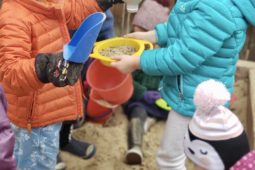Seventeen years ago, next month, I left my husband because I knew in my heart I was attracted to women. Yet, I’m still not ‘out’ in academia.
I own a preschool and live above the school with my wife. When I originally opened the preschool, I was advised to keep my gayness on the down-low. I desperately wanted people to enroll in my program and they certainly did not need to know I am a lesbian. Neither did I feel comfortable having books in my school library related to LGBTQ themes (even though I owned them) – Heather Has Two Mommies or And Tango Makes Three.
Visiting families might ask, “Is your husband background checked?” or “What does your husband do?” Then I would share that my wife is background checked as part of our licensing requirement. My sexual orientation also makes for a great filter of potential families. If you don’t feel comfortable with your child having a teacher in a same-sex relationship, then you’ll likely not feel comfortable with other aspects of our program. The tours either quickly ended or parents were delighted to find such diversity in our town. In some ways it became easier once same-sex marriage was federally legalized. “I live upstairs with my wife.”
This past year has been a journey. Our program supported a family as their preschooler publicly transitioned genders. While sexual orientation and gender identity are two entirely different concepts, they are often merged together through our ever-expanding alphabet-soup acronym – LGBTQIA. If a family had issue with our support of a child transitioning gender, what did they think of me? While our journey of celebration and support for our preschooler who is transgender will be the topic of a future blog post, it’s influenced my thoughts on the importance of visibility moving forward.

In my college classes, I’ve always been somewhat closeted. When I first starting teaching in the early-2000s, I recall going to the director of the preschool I was working in (it was a lab school on a University campus) and sharing that I had begun dating women. I wanted her to hear it from me, instead of from a concerned family.
When I moved to another University several years later, a few of my mentor teachers were closeted. I assumed that was just what you did. Don’t ask, don’t tell. Granted, the campus was fairly conservative. I was also hindered by my own youth on a college campus where the average student age when I started was 32. I was nowhere near my thirties! I didn’t need yet another reason for students to discredit my teaching. I was mindful to use gender-neutral language when referring to my life. “We went camping this weekend” or “My partner and I bought a house.” A handful of students knew I was in a same-sex relationship – those in leadership positions in the Human Development Club that I advised and a handful of teaching assistants. Students who spent way too much time in my office to continue to bother with the façade.
Then I briefly stepped away from academia when I moved back to my hometown to open a progressive preschool. A hometown that has not always been LGBTQ-friendly. A hometown where I didn’t feel comfortable walking down the street holding hands with my wife. A hometown where I was verbally assaulted for being a lesbian long before I ever knew I was attracted to women. There was no question in my mind that my gayness had to be on the back-burner.
Before long, I was teaching at our local community college and another four-year University. Again, I was using gender-neutral, closeted language. A handful of out LGBTQ students have found me, not to be fooled by my clever use of words.
I’m tired. I’m tired of using gender-neutral language to refer to someone who is legally my wife. I’m tired of avoiding authentic, organic conversations with my college students before and after class about our personal lives. I can be out to 4-year-olds and their families, but not to my college students. I recently had a college intern at my preschool refer to my wife as the “woman who works upstairs.” While my preschool library now has books like Jacob’s New Dress and Introducing Teddy, I somehow can’t bring myself to be out in academia.
Enough is enough. I’m done.
My college students need to see me as an out lesbian who works with young children. And that it’s okay… And that my preschool families embrace us… Is my program the right fit for everyone? Of course not. But for a large portion of the population, my sexual orientation is irrelevant and may even serve to strengthen my awareness of issues related to gender, sexual orientation, and a multitude of other non-majority groups.
This is why when an email came through last week from our University’s new diversity coordinator to volunteer to staff a booth at our local Pride festival, I volunteered. Sign me up. Growing up in this town, there was no Pride festival. If one future or current college student sees me on that day, and I can change one life by simply being visible and proud, then it will be worth it. I look forward to the journey ahead….
You can’t be what you can’t see…
(M.W. Edelman)

















